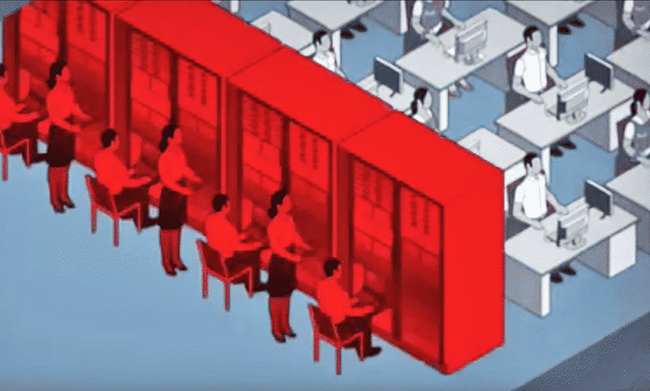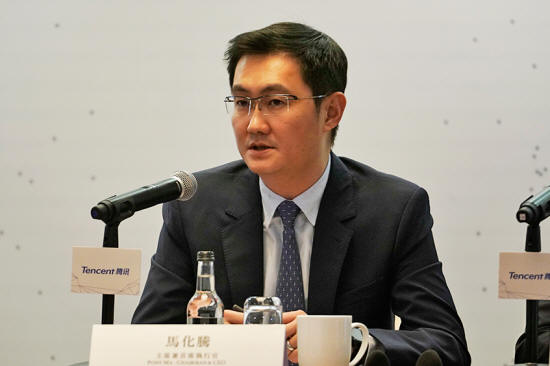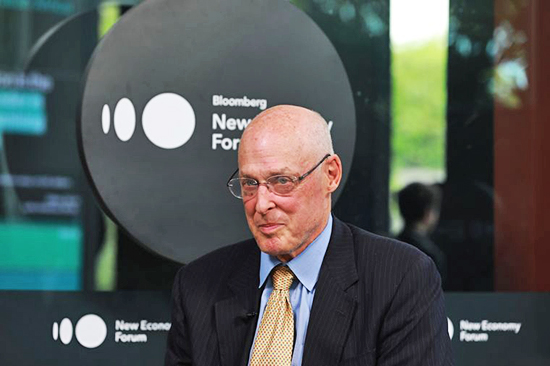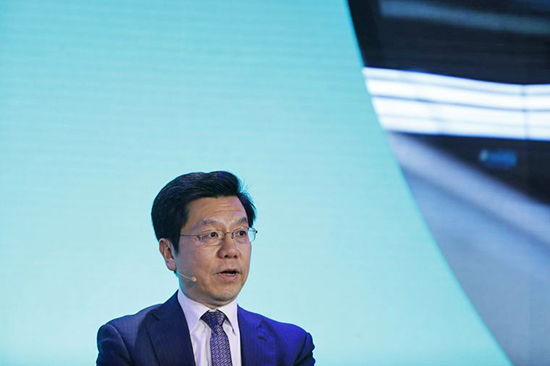|

by David Ramli
November 08,
2018
from
BloombergNews Website

YouTube
Because China is a full-blown Technocracy,
strategic values are polar opposites to freedom
and liberty.
China wants total control over content and the
minds that consume it, but Technocrats in the
U.S. are not far behind.
Source
The Internet is Splitting in Two amid U.S.-China Spat
Western bigwigs were a no-show at China's biggest web conference.
But in their absence, the
local overseers of the nation's technology industry were only too
happy to plug their unique vision for the global Internet.
Unlike 2017, when Tim Cook and Sundar Pichai graced
the World Internet Conference in Wuzhen, this year's
gathering was a decidedly domestic affair, presided over by the
likes of Tencent Holdings Ltd. Chairman Ma Huateng.
Given the floor, they
again pushed the concept of a rigidly policed medium that -
nonetheless - is a wellspring of innovation to revolutionize
businesses and modernize the Chinese economy.

Ma
Huateng
That first part flies in the face of the familiar U.S.-led model,
yet has produced two of the world's 10 most valuable companies:
That rapid ascendancy
prompted former Google honcho Eric Schmidt to declare the
Internet will split down the middle within
the next decade, as authoritarian
governments adopt China's all-encompassing controls.
On one side is a cyberspace arena that espouses open communication
while the other is a walled-off, thoroughly scrubbed world where
many are eager to sign away their data in exchange for services.
At China's most important
tech industry confab this week, Ma and a clutch of government
officials stressed it's the country's destiny to become an Internet
power, and called for more balanced governance of cyberspace.
China's regulators have trumpeted its concept of "cyber-sovereignty"
since the inaugural conference in 2014.
But the dichotomy between
the American and Chinese tech industries has never attracted as much
scrutiny as today, when the world's two richest countries are
butting heads in a conflict that may shape a new world order.
As U.S. icons like
Google and
Facebook come under fire for
privacy violations and enabling hate speech,
their Chinese counterparts are touting theirs as the superior model:
one geared toward the
interests of the state.
"The Chinese
economy is a vast ocean. Storms cannot disrupt it," Ma, who
is also known as Pony, told delegates.
"This ocean holds
massive market potential and also great room for innovation.
I believe, this isn't just a development opportunity for the
Internet industry, but for all sectors.
It's not just an
opportunity for China, but for the entire world."
Remarks from Chinese
President Xi Jinping read out at the start of the conference
called for "mutual respect" in cyberspace between the two nations.
The current rift in their
approaches however has profound implications and may bar the likes
of Facebook Inc. and Alphabet Inc. from any meaningful presence in
the world's largest Internet and mobile arena.
It's another
manifestation of what former U.S. Treasury Secretary Hank Paulson
called an "economic iron curtain" dividing the world if the two
nations fail to resolve their strategic differences.

Hank
Paulson
Unlike the relatively hands-off American model, the Chinese approach
is geared toward one over-arching imperative - propelling and
safeguarding the ruling Communist Party.
Anything deemed to
undermine that objective, from pornography and addictive games to
pockets of dissent, is ruthlessly rooted out when discovered.
To wit, China has the
lowest level of
Internet freedom among 65
countries polled by
Freedom House.
Critics of the model say players like Alibaba and Tencent thrive
because Beijing
dampens competition by making it
nigh-impossible for global players such as Facebook to operate.
They
say the government's heavy hand and unpredictability is
counter-productive.
Exhibit A:
a months-long
crackdown on gaming that helped wipe out more than $200 billion
of Tencent's market value this year. That cultivates a pervasive
climate of fear, said Gary Rieschel, founding partner at Qiming
Venture Partners.
"Every time you
see one of these vast losses, you can see the Chinese
government," he said.
"We've never seen
a country solve the issues that China is trying to solve,
when your best and brightest people aren't fully committed
to being there. This is new territory, we've not seen this
before."
The walled-garden
argument fails to take into account a level of competition that puts
the American industry to shame.
Despite pervasive
censorship, the Chinese Internet has evolved into one of the most
vibrant town halls the world's ever seen - it's tough to truly rein
in a billion people - as an army of millenials live-stream in the
millions and super apps thrive with more users than there are
Americans.
From Tencent's
WeChat to
Bytedance Ltd.'s short-video repository
Douyin, the global industry
is starting to realize the richness of the Chinese Internet.

Kai-fu Lee
"Why couldn't the
U.S. and China both invest in the same company?" Sinovation
Ventures' Kai-fu Lee said at the Bloomberg New Economy Forum
this week.
"This is definitely
not a war. But again it doesn't look like we're on the path to
be able to do that dream team investment."
While some say censorship
stifles creativity, others point to a vibrant ecosystem in China.
Hillhouse Capital Chairman Zhang Lei argues the industry
remains dynamic and the prospect of losing one's shirt in highly
volatile markets can motivate serious entrepreneurs.
"You can walk away
without your wallet and I think that actually inspires a
completely different set of companies born in that digital,
savvy and mobile-native environment."
Central to the idea of a
Chinese-centric Internet is data sovereignty and that information of
citizens must be stored in-country and accessible on demand, a
concept enshrined in Chinese law since 2017.
That philosophy has since
been embraced by governments from India to Southeast Asia.
American multinationals
who operate in China have complied:
Apple Inc. decided
last year to set up a venture with a local government to store
iOS user data on local servers. Alphabet's Google explored a
censored search engine to help it get back into the country.
And Facebook's Mark
Zuckerberg has been
courting Beijing for years.
And as China plays the long game selling its concept of a closely
controlled Internet to the developing world - alongside the
technology needed to pull it off - the Communist Party's vision of a
web where governments pull the strings could wind up the model for
the next billion users.
"Every country is
sovereign and understands its situation better than outsiders.
We should never come and tell a country ‘this is good for you,
this is bad for you'," said former Pakistan Prime Minister
Shaukat Aziz.
"A sovereign country
has to decide what's good for it. I don't think there's one
model that works for everything for any product around the
world."
|





